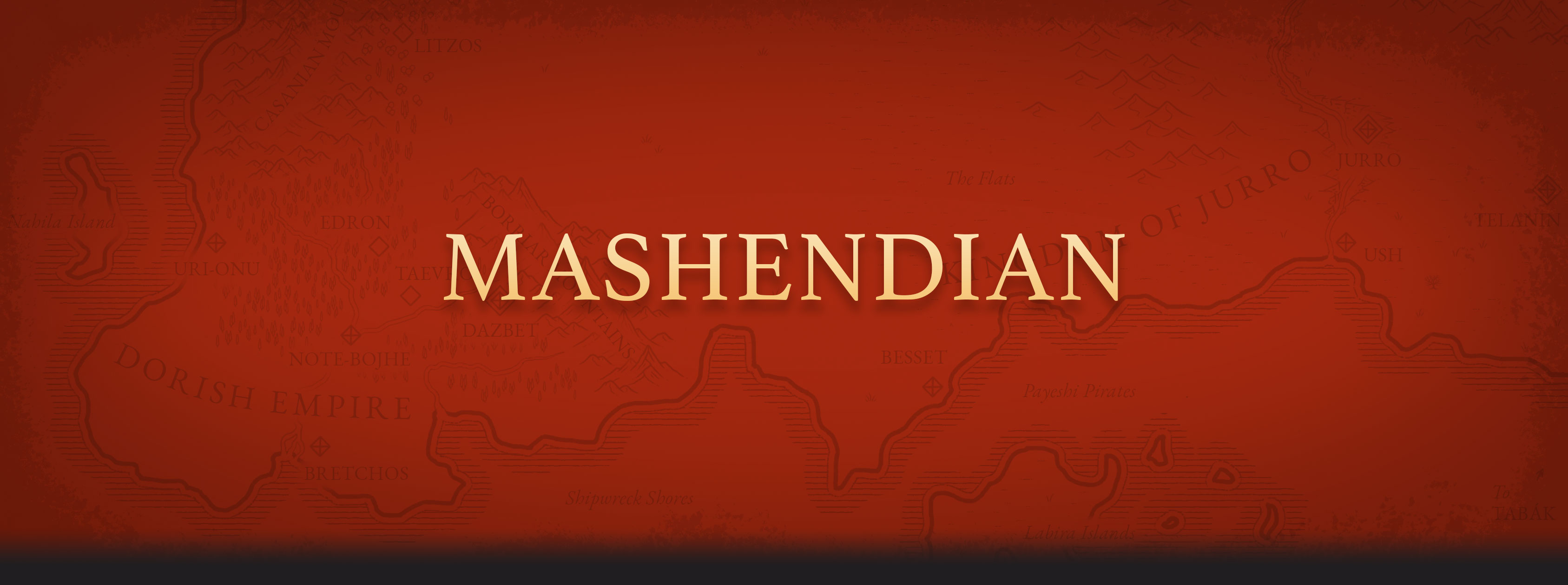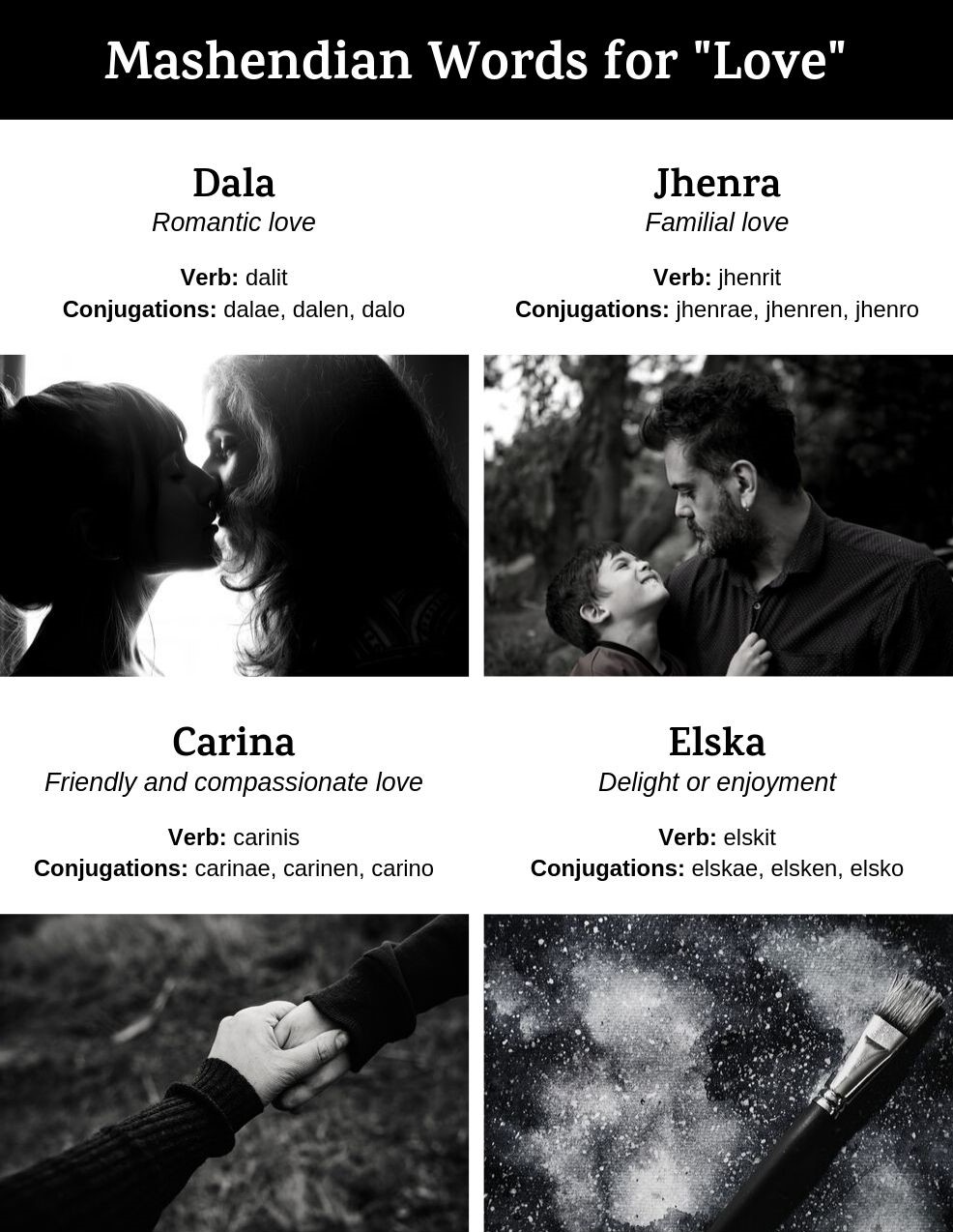Mashendian
The Mashendian language is spoken across the Northern Plains and by the Dorins of the Dorish Empire. It is a cousin to the Asikian and Arrothi languages.Note: This page is still a partial work in progress. More is to come.
Writing System
The Mashendian language uses the Tabaro writing system. Tabaro is a phonetic system originating in northern Nerasia.
The Tabaro alphabet has 30 characters, and five diphthongs. The script's straight, angular lines and large dots (often created in artistic renderings with separate colors) are traditionally created with a specific stylus that is narrow on one end and blunted on the other. A writer will create thin lines with the narrow end of the stylus, and flip it over to create consistently-sized dots with the other end of the stylus.
Coming soon: Alphabet and punctuation
Phonology
Accent
All r's are trilled or lightly rolled, especially when at the end of a word. When spoken properly, all consonants are clearly pronounced, especially t's and d's, which receive a slight pop when closing out a word. In words with three syllables, the emphasis will most often be on the first syllable. A helpful rule of thumb for reading Mashendian verbs in the infinitive: If the verb ends in a t, the accent will be on the last syllable. If the verb ends in another letter, the accent will be on the preceding syllable.Tricky pronunciation
Here is a quick guide to sounds in Mashendian that may not be pronounced the way you expect:- jh is pronounced like the s in Nerasia or treasure, or like the French j in je. This is a stand-in for a single letter in the Tabaro script.
- dr is pronounced as a clear d + r sound, not the jr sound in English words like drama and drastic.
- e is pronounced in its short form; it is the e in set and less.
- ae is pronounced ey, as in play, make, and obey. This is a stand-in for a single letter in the Tabaro script.
- i is usually pronounced ee, as in meet, bean, and see. (In some exceptions, it is pronounced short, as in win or big.)
- ø is pronounced similarly to the Norwegian vowel. For English speakers, it may be helpful to think of the vowel sound as halfway between an o and an i; or, think of it as the vowel sound in her, but without the r.
- -ut Many adverbs in Mashendian end in the -ut (oo t) sound. This ending rhymes with foot and soot, not mutt or hut.
Morphology
Verb conjugation
The suffixes of verbs change according to their tense and subject. The following chart shows the verb endings for the present, past, and future tense. Note that the plurality of the subject has no impact on the verb's suffix. (In other words, "I run" is "Ne stamae," and "We run" is "Nu stamae;" the verb form does not change.) Note that the third person present and past has two forms. The o endings are more common, and are the default. In some cases where verbs use the i endings, it will be indicated in the notes in the official Google Doc dictionary. The future tense does not ever have the i ending. This is because its suffix originated from the word ushit (to go), which is usho in the third person present tense. Conjugation in action To conjugate a Mashendian verb, remove the ending of the infinitive form (usually -it or -is), and replace it with the appropriate ending for its tense and subject. Examples:to drink | kabrit (The base verb form is kabr.)
I drink | Ne kabrae
You drink | Se kabren
He drinks | Le kabro
to learn | chatis (The base verb form is chat.)
I learned | Ne chatarae
You learned | Se chataren
They learned | Lu chataro
to jump | nagit (The base verb form is nag.)
We will jump | Nu nagishae
You will jump | Se nagishen
It will jump | Te nagisho
Exceptions and special rules With verbs that have a base form ending in an r, that r will be dropped in the past tense. Take nastrit for example, which has a base form of nastr. You could think about it as losing that r in order to gain a new one; or, you could say that in the past tense, an added a has jumped inside the word, just before the r. Here's what that looks like:to come | nastrit
I came | Ne nastarae (Not nastrarae) (Compare to the present form: nastrae)
You came | Se nastaren
She came | Le nastari
Verbs that have base forms ending in "sh" will use the future tense endings of -isae, -isen, and -iso, rather than the typical -ishae, -ishen, and -isho. For example, the word for "bow down," stashit, becomes stashisae, stashisen, etc., rather than stashishae, stashishen.
Here is the verb stashit conjugated in present, past, and future tense (respectively), in the first person singular:
I bow | Ne stashae
I bowed | Ne stasharae
I will bow | Ne stashisae
Commands
To change a verb into a command form, remove the infinitive ending and replace it with -eir. (Pronounced like "air," "stare," "bear.") Examples:to attack | hashit (The base verb form is hash.)
Attack! | Hasheir!
to be | hamit (The base verb form is ham.)
Be happy! | Brost hameir!
Verbs into nouns
Many verbs have corresponding noun forms. This is typically just the base verb form, occasionally with the letter "-a" added to the end. For example, the verb "kabrit" means "to drink." If you want to refer to a beverage (a drink), you would use the word "kabra." Similarly, "nerantis" is the verb for "to tell a story," while "nerant" is the noun, "story." Another noun form, one that describes a person who does an action, is found by adding "-o" to the infinitive form. So, a drinker is "kabrito," and a storyteller is "nerantiso."Pronouns
Mashendian has eight basic pronouns: Four in the singular, and four in the plural. The pronoun form is the same for objects and direct objects. Mashendian does not have separate words for "he" or "she." Le is a generic third-person, singular pronoun that is used for a person of either gender. Te is a third-person pronoun that is used for inanimate objects and animals. The rare exception may be for very well-loved pets, but even then, using le instead of te might get you some funny looks.Plural nouns
To make a noun plural in Mashendian, you add -e to the end of the word. Exceptions: If the singular form ends in an a or e, replace that vowel with an i. If the word following the noun begins with an e, add -i to the end of the noun instead of -e. Sample words and phrases:boy | juf
boys | jufe
sad boys | jufi else
finger | ashto
fingers | ashtoe (pronounced AHSH-toh-eh)
friend | nasdra
friends | nasdri
sound | tamse
sounds | tamsi
Definite articles
To make a noun definite in Mashendian, you add the suffix -en (singular) or -ene (plural). In the case of nouns that end in a, the a is dropped in the definite form. Sample words:arrow | brast
the arrow | brasten
arrows | braste
the arrows | brastene
friend | nasdra
the friend | nasdren
friends | nasdri
the friends | nasdrene
Syntax
Basic sentence structure
Mashendian is an SOV language (subject, object, verb). Sample sentences:"I buy bread." (Translation)
"I bread buy." (SOV structure)
"Ne bashe nabrae." (Mashendian)
(Ne = I, bashe = bread, nabrae = buy)
"You slay the monster." (Translation)
"You the monster slay." (SOV structure)
"Se musten katchren." (Mashendian)
(Se = you, musten = the monster, katchren = slay)
Adjectives
Adjectives go after the words they modify. Sample phrases:orange leaf | elet majhe
big leaf | elet grot
Adverbs
Adverbs go before the words they modify. Sample phrases:run away | nosh stameir
run quickly | bastut stameir
Prepositions
Prepositions come before the direct object they modify. Sample phrase and sentences:"I come to you." | "Ne a se nastrae."
"She eats with us." | "Le sta nu izo."
"Behind you!" | "Ashon se!"
"I want to run to town." | "Ne stamit a dazo kisrae."
"I quickly throw a big leaf at the girl." | "Ne elet grot bastut kratae a stameiren."
Negation
You can turn a verb into the negative by adding the word jes before it. Sample sentences:"She loves me, she loves me not." | "Le ne dalo, le ne jes dalo."
"I'll follow you. I won't follow him." | "Ne se sagrishae. Ne le jes sagrishae."
The word jes can also be used in the absence of a verb, so long as one is implied. For example, in the previous example, most Mashendian would drop out the second "sagrishae" as redundant, and simply say: "Ne se sagrishae. Ne le jes." Further examples:"I'm a lover, not a fighter." | "Ne cariniso torae, jes novisho."
(ne = I, cariniso = lover, torae = am, jes = not, novisho = fighter)
"That's pink, not red." | "Ate mezme toro, jes mujhe."
(ate = that, mezme = pink, toro = is, jes = not, mujhe = red)
Vocabulary
Full dictionary
The full vocabulary of Mashendian words, including their pronunciation and other information, is located in the official Google Doc dictionary.Torit vs. hamit
It is worthwhile to understand the difference between the words torit and hamit. Both verbs mean "to be", but are used in separate situations. Torit Used for:- Describing permanent states
- Definitions
- Names
"The stone is gray." | "Chosen tashe toren."
"It is a bird." | "Te bajhan toro."
"I am Jensen." | "Ne Jensen torae."
Hamit Used for:- Describing temporary situations
- Weather
- Mood
"We are tired." | "Nu nift hamae."
"The dog is dirty (right now)." | "Braesen nashuf hamo."
"You all are happy." | "Su brost hamen."
Words for "love"
Unlike English, Mashendian has four base words for love: dalit, jhenrit, carinis, and elskit. (Or, in noun forms: dala, jhenra, carina, and elska.) Dalit This word is used for romantic and sexual love. Dala, the noun form, can be a euphemism for sexual activity/intercourse. Jhenrit This word is used for the love between family members. Depending on the context, this can include the love between two spouses, but it is generally used for the love between siblings, parents and children, cousins, etc. Carinis This word has a broad meaning that can be used in a lot of circumstances. Its primary usage is for the love between friends (especially in the verb form), but secondary connotations include concepts like compassion, tenderness, and kindness. In this sense, it could apply to certain expressions of love between romantic partners or family members. Elskit This word is used for expressing delight or enjoyment of a thing or experience. (Example: "I love to laugh." | "Ne nabris elskae.") When applied to a person, it implies an enjoyment of that individual's personality or persona, rather than an intimidate friendship or relationship.Numbers
Here's how to count to ten in Mashendian:- ki
- ska
- note
- sho
- mute
- kaf
- brosh
- viyae
- chof
- ash
Want to learn Mashendian?
Join the free online class!Dictionary
The entire Mashendian dictionary can be accessed online.Remove these ads. Join the Worldbuilders Guild












Comments